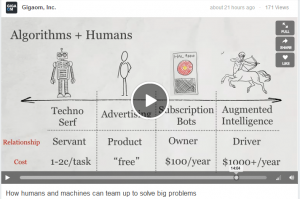Declara is one of the most unique startups in the world of enterprise-scale learning platforms. The company has built an intelligent social learning system that is often referred to in the media as a combination of Google’s Knowledge Graph and Facebook’s Social Graph.
Declara’s vision is to create and leverage a Cognitive Graph that delivers neuroscience-inspired personalized learning based on the context of real-world experiences, intent, outcomes and social relationships.
The system aims to deliver content recommendations and facilitate the most appropriate social connections between learners across large organizations and social communities. The platform integrates the latest capabilities of artificial intelligence subdomains – machine-learning and deep-learning to scale-up predictive analytics and prescriptive learning experiences based on an individual’s intentions, capabilities and needs.
The company sees a very rich and untapped landscape of learning analytics that will benefit from neuroscience-based insights on learning experiences. The ‘adaptive’ and ‘intelligent’ labels simply mean that Declara’s infrastructure learns over time based on real-world interactions and outcomes.
Declara’s CEO Ramona Pierson (Twitter) has an amazing comeback life story and a brilliant mind that sees the convergence of neuro-cognitive science, intelligent social systems, semantic search, graph databases, et al. Co-Founder Nelson Gonzalez (LinkedIn; Twitter) brings a pragmatic and optimistic lens to learning analytics and the intersection of local cultural elements and semantic search.
Declara has a very clear scale-out oriented business model that targets large customers such as national government associations (e.g. Mexico’s SNTE, Australia’s CSE) and enterprises like Genetech. They picked a wonderful problem to solve. Declara is a startup to watch…!!
Learn More:
- Declara on Twitter
- Bloomberg article
- Business Week Interview Ramona Pierson Novemmber 2013
- Semantic Web blog post
Interesting links on cognitive graph:
- IBM is hiring an intern for Social Analytics and Cognitive Graph (umm!!);
- Nodus Labs Graph
- Garry’s tags on Machine-Learning; Deep-Learning; Graph; Adaptive; Watson
Videos
Ramona Pierson
Interview at 2014 Gigaom event
Ramona Pierson speaking
Nelson Gonzalez – 2010 brief interview – hopefully more Youtube clips will appear soon!
https://www.youtube.com/watch?v=xmjDVrz5X5g

